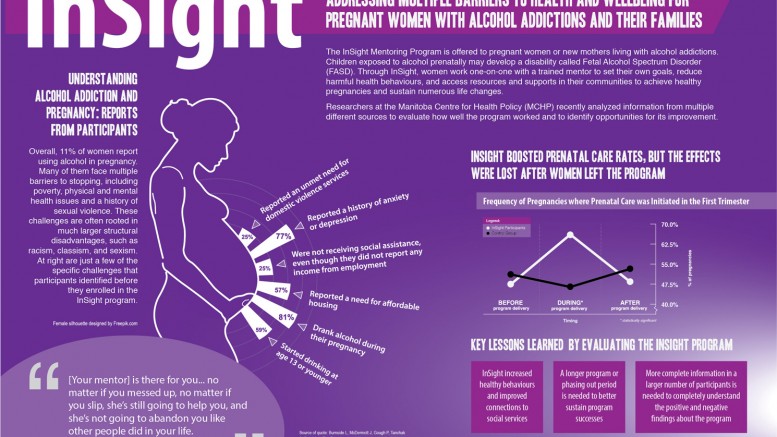The Manitoba Centre for Health Policy at the University of Manitoba recently released an analysis of the InSight Mentoring Program, a provincial program intended to help prevent the development of Fetal Alcohol Spectrum Disorders (FASD).
The study focused on the program’s relative ability to reduce alcohol consumption during pregnancy, and also analyzed how access to social services such as income assistance, child and family services, and housing were affected.
InSight began in 1998 and offers one-on-one mentoring to women at risk of having children with FASD. The program has intake offices across Manitoba and serves about 240 women at a time.
Women may be referred to the program by a health care provider or by self-referral and are able to access the mentoring services for a three year period. The study examined the outcomes of the program for 226 women who had participated between 2001 and 2008.
Chelsea Ruth, lead author of the study and a research scientist at the Manitoba Centre for Health Policy, told the Manitoban that instead of only focusing on whether or not women quit drinking, it was important to “look at all the other things they have achieved because you cannot look at an outcome in isolation.”
For example, upon entry 26 per cent of women were not using a food bank but needed one, while upon completion of the program this dropped to 9.5 per cent.
According to the report, 11 per cent of Canadian women report using alcohol during pregnancy, with rates of alcohol use disproportionately high among certain demographic groups like low-income women.
In its comparison between InSight participants and pregnant women who were drinking and on income assistance outside the program, the report was not able to come to any firm conclusions about differences in the rates of alcohol use between the two groups.
“Decreased use of alcohol during pregnancy is suggested but could not be confirmed in this sample,” the report states.
Out of 156 participants for whom data was available, 19.4 per cent were able to maintain a low-risk pattern of drinking throughout their pregnancy – 9.6 per cent of this group were able to abstain from alcohol entirely. This means that 81 per cent were still using alcohol in a high-risk manner during the program.
The report also found a significant increase in prenatal visits by women enrolled in the InSight program.
“We were very pleasantly surprised by how well [InSight] did in getting [participants] to engage with prenatal care. Prenatal care is important on many levels but it also represents engagement with the health care system […] It is another opportunity to help them access social services,” Ruth said.
After women exited the program there were some who had difficulty maintaining the changes.
The report recommends an extension of the program beyond three years. This would give women more time to further develop social supports needed to maintain gains made.
One-on-one mentoring constitutes the structural foundation of the program, according to Jill Isbister, program and policy consultant in the area of FASD prevention and the program manager at InSight.
“[Mentors] are able to form a close relationship because they have the time to do so. We have small case loads and are able to work with [women] over a number of years,” Isbister told the Manitoban.
Mentors may offer services such as transportation to appointments, assistance in navigating social support systems, and guidance based on respect and trust.
Mentors are also able to tailor the program to suit the needs of each participant so that the participant can set her own goals for success. Just as each woman is unique and complex, so is the mentorship required to help her achieve her goals, according to Isbister.
This flexibility helps build trust between mentors and program participants. It is not only about having a healthy pregnancy but having a healthy mother to provide for her child, she said.
“For most of the women in our program, they are using substances to cope with other life challenges […] That is what we need to address to make it possible to find a different way to cope with these stresses.”
In 2012, the Canada FASD Research Network conducted a qualitative evaluation of FASD prevention mentoring programs that included Insight Manitoba.
In interviews conducted by the network, participants shared some of their thoughts on how mentoring had made a difference in their lives.
Having someone to support them, even if they were not fully abstaining from alcohol, helped participants across jurisdictions to keep going and believe in their own success, the report concluded. They felt less judged and yet still held accountable for their actions.



